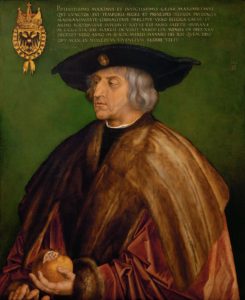High mountains. Vibrant city. Charming region. The claim to diversity is not an empty boast. It’s based on the happy co-existence of a vibrant city and small villages with a rural character. Just take a 30 minute walk from the Golden Roof to the high alpine free riding paradise to experience this wonderful diversity.
City meets country
The Innsbruck region consists of Innsbruck, the capital of the Austrian province of Tyrol, and the surrounding villages which lie on a sunny low mountain terrace with fantastic views of the city. To the west, in the Inn Valley, there’s a row of pretty villages extending as far as the entrance to the Ötztal valley. The combination of modest villages and majestic nature can also be found in the Sellraintal valley which ends in the Kühtai at an altitude of 2,020 metres. Finally, the region of Innsbruck also comprises the Mieminger Plateau with “Tyrol’s longest summer” and plenty of scenic attractions.
City meets mountain
Here the hustle and bustle of a vibrant city, here the solitude of the mountains under the watchful eye of the golden eagle. Elegant shopping in the Town Hall Galleries designed by Dominique Perrault or in one of the boutiques in the Old Town. Around half an hour away there are mountain jackdaws circling peaks more than 2,000 metres high, and via ferratas, ski slopes and hiking trails provide the perfect opportunity to enjoy lots of sporting activity.

Man meets nature
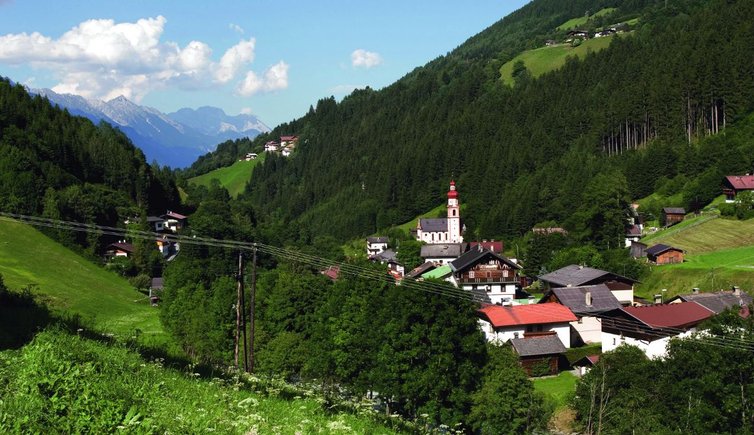
Olympia SkiWorld comprises no fewer than nine ski areas. There are also plenty of attractions for hikers and mountain bikers, with the Karwendel Naturpark, Austria’s largest nature reserve, on the doorstep. 115 km of designated mountain bike trails pose their own special challenge, whilst the Inn Cycle Path is for those who prefer a more gentle and relaxed ride. Bikepark Innsbruck has something to keep everyone happy, and both beginners and families will find suitable trails as well as wild downhillers, snow bike and fat bike included. There are also four golf courses and cross-country ski trails, via ferratas, bouldering halls, toboggan runs and lots more
History meets design
The fabulous collection of Renaissance art and the Chamber of Curiosities in Ambras Castle, the unique monument of the “Black Men” around Emperor Maximilian I’s (empty) tomb, the opulent Baroque splendour of Stams Abbey, imperial grandeur on the trail of the Habsburgs in the Imperial Palace – these are but a few of the historical trails that are there to be followed in the Innsbruck region. The search for traces of the 20th and 21st centuries is dominated by architectural greats such as Zaha Hadid, Dominique Perrault, Heinz Tesar, Franz Baumann and Max Weiler, the painter who was born near Innsbruck.
ARRIVAL
Arriving Into Innsbruck is easy. Thanks to the well maintained and connected roads, railways and Airport network.
Innsbruck is just about 1 hour away from Vienna in a plane. Innsbruck airport is well connected to other major airports of the world. The other closest and biggest airport is Munich Airport which is less than 2 hours away from Innsbruck (via Train or by drive).
Arriving via train is no less convenient as it takes only 4 hours from Vienna and less than 2 hours from Munich. Trains are also available directly from Munich airport to Innsbruck Hbf.
Few people argue that exploring Austria in a car gives you more access to beauty and more liberty of stopping on a scenic place, and we can’t deny it! Roads are just too smooth, driving, for most parts, is very easy and takes about 5 and a half hours from Vienna and less than 2 hours from Munich.
Trains are really comfortable and efficient, roads are wonderful to drive on and Air plane is well, an Airplane.
STAY
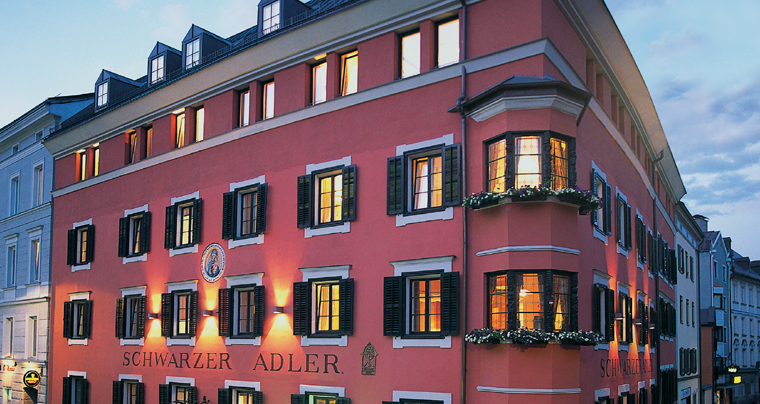
So we know Innsbruck is beautiful, Historic and Adventurous. Staying somewhere other than close to the Old town would be doing injustice to its legacy. Which is why the best place to stay in Innsbruck is Hotel Schwarzer Adler. A perfect hotel for History buffs and, well, non history buffs too. Hotel Schwarzer Adler is just about 5 min walk away from the old town and close to all attractions. It is Beautiful, Historic, Heritage, comfortable and everything a visitor needs for enjoying Innsbruck. Hotel Schwarzer Adler has 500 years of tylorean history and perfect for families, couples and solo travelers.
Something also worth mentioning in my opinion is the hospitality here. The front desk staff are just very warm, helpful and accommodating to all needs. My experience here was really delightful.
HISTORY
The Golden Roof, the Old Town and the Black Men (28 larger-than-life bronze statues surrounding his cenotaph) – these popular attractions are inextricably linked with Innsbruck’s history and attract countless visitors every year, and with good reason. For they all have one thing in common: the Habsburg emperor Maximilian I, also known as the “last Knight” and “first European”. It was Innsbruck he chose as the centre of his empire, and he not only created cultural and historical highlights in the city but also had a great love of the surrounding natural landscape. 2019 is the Year of Maximilian, marking the 500th anniversary of his death.
We were really lucky to visit Innsbruck in 2019 as we got to enjoy the Exhibition on Emperor Maximilian I’s life at the Imperial Palace.
In the 1490s Emperor Maximilian I used to love staying in Innsbruck, the capital of the “Land in the Mountains” and, in the period between the Middle Ages and the Renaissance, he made the city, with its population of 5,000 inhabitants at that time, a central point of his empire. As an important link between southern and northern Europe, Innsbruck soon became a centre of art and hub for international events, and the city experienced a golden age under Emperor Maximilian that still resonates to this day.
Golden Innsbruck – Golden Roof

Maximilian’s marriages to Mary of Burgundy and Bianca Maria Sforza of Milan – the first a love marriage, the second a marriage of convenience – are the subject of a relief adorning the Golden Roof (Goldenes Dachl) in Innsbruck’s Old Town. After Mary of Burgundy died in a riding accident after just five years of marriage, Maximilian married Bianca Maria Sforza, mainly because of her large dowry. The splendid oriel, built by Maximilian to celebrate the turn of the century in 1500, is decorated with 2,657 gold-plated copper tiles. The Golden Roof is today part of a museum and, for the Year of Maximilian, the Golden Roof Museum was barrier-free so that, from 11 January 2019, wheelchair users were also be able to enjoy the “imperial view of Innsbruck” from the magnificent oriel window.
A tomb without a body
Innsbruck became a centre of art under Maximilian, so special attention was given to the design of his own tomb in the Court Church (Hofkirche). The Habsburg emperor had commissioned major international artists of his time, and the result was the creation of 28 larger-than-life bronze statues, the “Black Men” (Schwarze Mander) which represent Maximilian’s heroes and ancestors and flank his tomb. Eight of the “Men” are actually women, including Maximilian’s two wives, but the curious thing about the monument is that the tomb is empty, Maximilian having been buried in Wiener Neustadt, a city south of Vienna.
Maximilian and Innsbruck – as modern as ever
Although Maximilian’s last visit to Innsbruck was arguably a disappointment for him, there‘s hardly any other Habsburg emperor who’s been so fondly remembered by the people right up to the present day. 500 years ago he embodied what modern life in Innsbruck is like today. On the one hand, people live here in a young, modern and open cultural city; on the other hand, the ability to enjoy nature and all it offers, in terms of sport in the surrounding mountains, is closer than in any other city. What both locals and visitors nowadays appreciate in Innsbruck also inspired Emperor Maximilian I, the “last Knight” and “first European”.
As part of the Year of Maximilian in 2019, the “Lightshow Max 500” took place until 20 January 2019, and will take place again from November 2019 to January 2020, taking visitors on a journey back in time through Maximilian‘s Innsbruck. The venue is the inner courtyard of Innsbruck‘s Imperial Court (Hofburg) which was expanded under Maximilian.
But now, enough about the history, because Innsbruck has plenty to offer for every kind of visitor.
Coming on to the Natural Beauty, Adventure and Hiking part of it, Innsbruck is unbeatable. No where else in Austria (if not the world) there is such perfect combination of City and Nature, Beauty and development, Mountains and roads. The beauty of Innsbruck leaves people in awe.
NOT TO BE MISSED: INNSBRUCK’S “MUST SEES”
Innsbruck Old Town. Hotspot for 500 years.
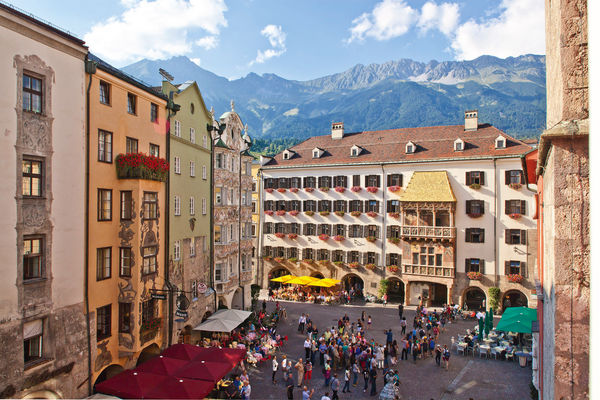
The city was an urban hotspot 500 years ago. This was when Emperor Maximilian I covered the Golden Roof with 2,657 gold-plated copper tiles in around 1500, which he then used as a royal box to watch jousting tournaments. Today there are Gothic arcades, a relaxed lifestyle in street cafés, Baroque fantasies realised imaginatively in the pink and white stucco on the Helblinghaus and magnificently in St. James’ Cathedral, which houses Lucas Cranach the Elder’s image of Mary. Take a deep breath and make your way up to the top of the City Tower, which has been providing the most wonderful views for more than 600 years.
Traces of the Habsburgs. Imperial Palace and Court Church.

The traces of the Habsburgs are to be found everywhere in Innsbruck. The Court Church, also known as the Schwarz-Mander-Kirche (Black Men Church) houses 28 larger than life bronze figures surrounding the empty tomb of Emperor Maximilian I. This is one of the greatest imperial tombs in Europe and is close to the “Hofburg” Imperial Palace, one of the three most important cultural buildings in Austria next to the Vienna Hofburg and Schönbrunn Palace.

It was Empress Maria Theresia who commissioned the remodelling of the Baroque palace with state rooms (Giant Hall) and imperial apartments.
The ever Sparkling Svarovski Crystal Worlds

Just a 30 minute shuttle ride away from Congress station, Svarovski is a real gem, a real wonder in Innsbruck. The entrance here probably the most iconic entrance in the world. Just by looking at a photograph of the entrance you recognize it. Glittering chambers of wonder designed by international artists unfold their magic, which continues outside in the gardens beneath the sparkling crystal cloud.
A special mention to the Daniels restaurant. It has delicacies from around the world. As an Indian, i was surprised to find Dal and naan bread on the menu in a non Indian restaurant in Austria. The taste was amazing.
Ambras Castle. Renaissance dreams.
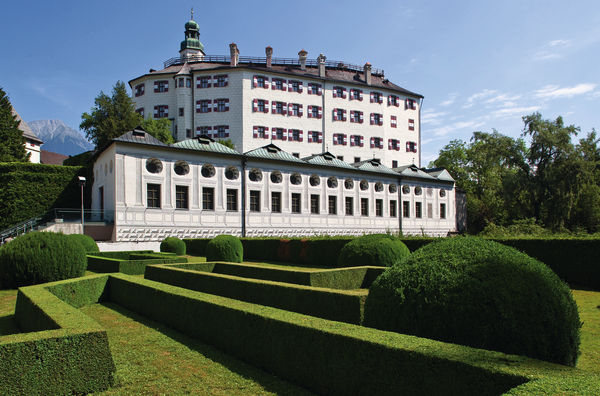
Perched on a hill to the south of Innsbruck is Ambras Castle, built by the Habsburg Archduke Ferdinand II as a demonstration of his love for Philippine Welser, his upper middle-class wife. The Chamber of Art and Curiosities is a source of endless wonder, revealing the Renaissance world with all sorts of strange, valuable and wonderful exhibits. The highlight of the castle is the magnificent Spanish Hall, which resounds in summer with the wonderful music of the Ambras Castle Concerts. P.s. There are also White peacocks here in the courtyard, As if Ambras Castle wasnt fascinating enough.
Maria Theresien Strasse. Where history comes alive.
The splendid avenue is lined with gorgeous Baroque and classical palaces. The Town Hall Galleries and Kaufhaus Tyrol are striking buildings in terms of their architecture and also delightful places to shop. The white and gold Anna Column rises majestically and, to the south, the Triumphal Arch marks the end of this impressive street, a living history book and place to enjoy spending a relaxed time strolling and looking around.
Museum of Tyrolean Folk Art. Embark on a journey through time!
The museum is home to an interesting and entertaining arrangement of historical costumes, a notable collection of nativity scenes, eerie and shimmering traditional figures and depictions of the harshness and poverty of what life used to be like in the mountains, taking you on an exciting journey back through time to previous centuries.
City meets mountains. Innsbruck’s Nordkettenbahnen.

In no other European city of a comparable size are the hustle and bustle of the city and the quiet solitude of the high mountains so close together as they are in Innsbruck. You can enjoy a quick espresso in one of the street cafés in the Old Town and, 20 minutes later, you’re in the kingdom of the ibex and chamois at an altitude of 2,300 metres. You can marvel at the fantastic 360-degree panorama and enjoy an intimate experience of the alpine fauna and flora. Call in at the Seegrube, 400 metres below, for the Ride & Dine (every Friday) and, on your way, you can experience a journey through some architectural gems of the 20th and 21st centuries: Zaha Hadid’s Hungerburgbahn stations, Franz Baumann’s cable car stations from the 1920s and Snøhetta’s architectural creations on the Nordkette Panorama Trail.
Wilten Abbey. Giants’ fierce battle and boys’ tender voices.
The battle between two giants led to the abbey’s construction, and the legend of the founding of Wilten Abbey is represented in the Gothic statue of the giant Haymon. Otherwise, Baroque splendour, magnificent frescoes and wrought-iron grids dominate the interior of the Collegiate Church of Wilten. The tender and harmonious voices of the world-famous Wilten Boys Choir are frequently heard here.
Bergisel Innsbruck. Sky jumpers past and present.
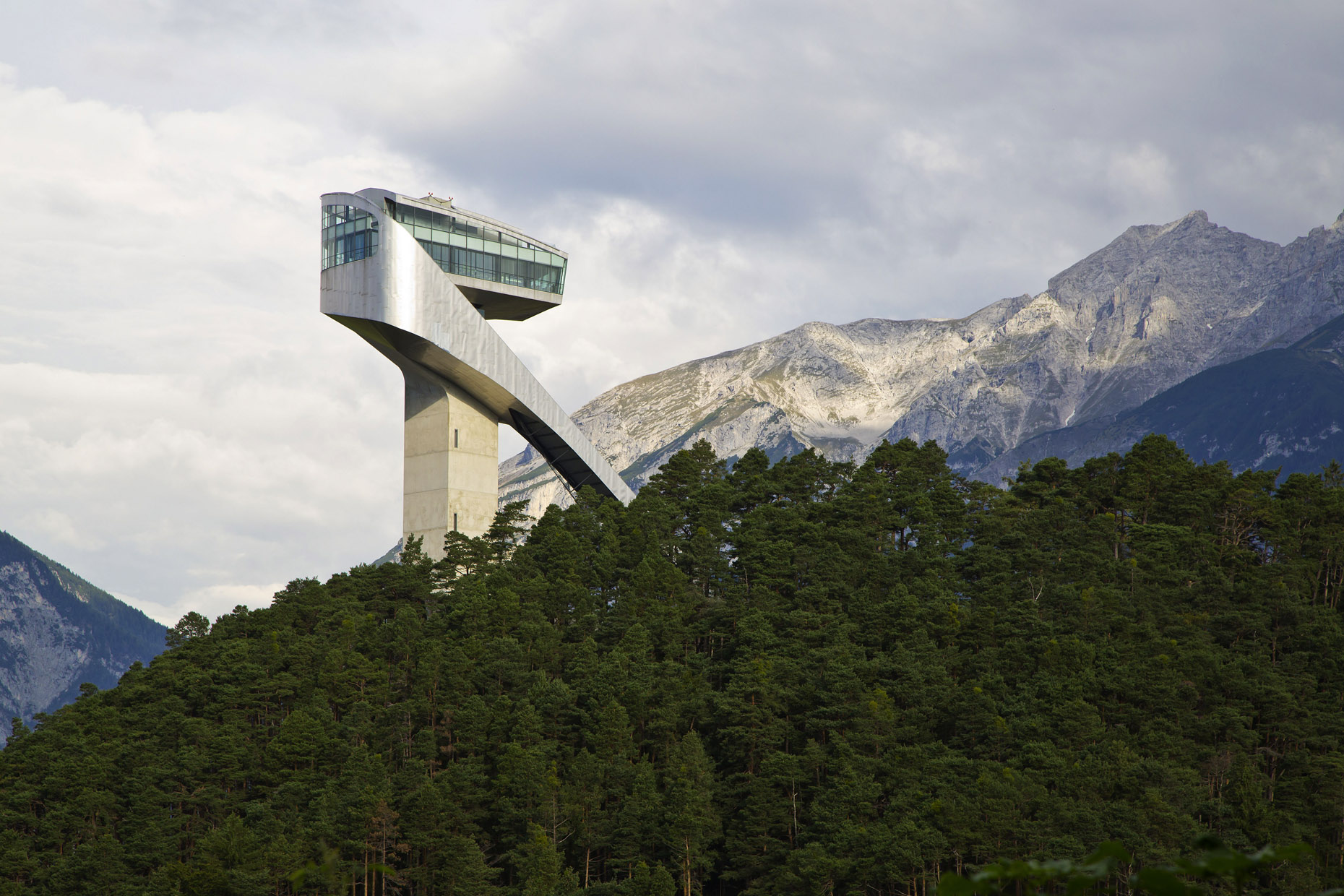
Zaha Hadid’s striking ski jump is the annual venue for a number of ski jumping events. The Giant Panoramic Painting, a realistic depiction of the 19th century battle painted on 1,000 m2 of canvas, is located in the Tirol Panorama museum. The Bergisel offers views of great architecture and the museum provides lots of interesting insights.
Stams Abbey. Baroque splendour surrounded by green meadows.
Anyone approaching Innsbruck from the west will be amazed by the mighty onion domes: yellow and white Baroque splendour surrounded by green meadows. It houses a unique high altar designed as a tree of life with 84 carved figures, and the wrought-iron rose lattice has 80 flowers, each different from the other. It also has a royal tomb and the Holy Blood Chapel. Please don’t forget to visit the abbey shop!
TOURISM
Boy! So much to see. Should be difficult to organize and see all of it, right?
WRONG!
Innsbruck is the most convenient city to tour, thanks to The Innsbruck Card!
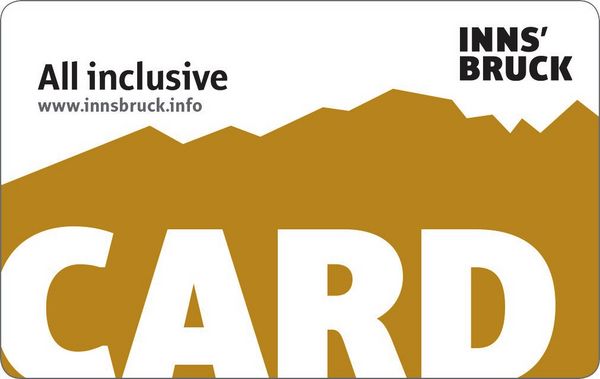
The Innsbruck Card is a all inclusive city card with a with a validity of either 24h, 48h or 72h and super duper convenient to use. I really mean it when I say all inclusive – it includes most (if not all) must sees and attractions in Innsbruck, public transport (including night buses, buses towards cable cars, etc.), Hop On Hop Off bus, rides on Nordkette and other cable cars (right to the top), Svarovski Kristallwelten with shuttle transport and cycle hire (for 3 hours *subject to availability).
All in all it includes almost everything everything you require to enjoy Innsbruck, and all of this in addition to giving you great value for money. Cant believe your eyes? See it for yourself here – https://www.innsbruck.info/en/sightseeing/innsbruck-card.html
All in all, miss Innsbruck at your own peril, It is one of a kind. Natural beauty at its best!


